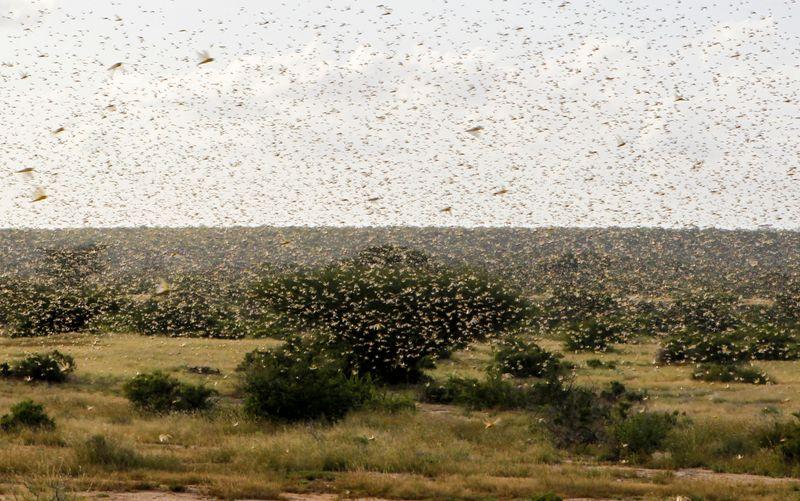
The threat of locust from the Horn of Africa to southwest Asia has been minimised or even eliminated due to moisture conditions in various countries of the region, National Food Security Minister Syed Fakhar Imam said on Friday.
Briefing the media persons after chairing a meeting of the National Locust Control Centre (NLCC), he said that the locust threat form Horn of Africa was very gave but now the swarms had turned to other sides as the hopper always moved to the areas wherever it could find food.
“The desert locust situation continues to improve in southwest Asia and there are initial signs of improvement in parts of East Africa. Nevertheless, it remains serious in Yemen and other areas of the Horn of Africa,” Imam said.
“We are fortunate that the swarms that were posing a big threat for Pakistan have turned to other sides, therefore we are safe now,” he said. He added that in “our neighbourhood, the situation in Iran is totally under controlled but some breeding sights are located in India – Rajasthan and Gujrat”.
Imam said that the Food and Agriculture Organization (FAO) had informed that the threat of locust was also subsiding in Rajasthan but controlled measures had been taken there. He added the government planned to remain prepared for any locust attack in the future.
“Locust can migrate from Indian state of Rajhastan to Pakistan,” the minister said. Therefore, he added: “Regular and intensive surveys will be maintained along the Pakistan-India border areas to detect any signs of a small second generation of breeding.”
The minister said that Rs26 billion package announced by the government to fight the locust attacks was aimed at recruiting human resources, purchasing necessary equipment and chemicals to eliminate the swarms in the country.
Locust emerged in the country in summer last year after a gap of 27 years. In January, the federal government declared a locust emergency in the country and since then, the authorities concerned have taken several measures to control the situation.
By now, locust was presented only in one district of Balochistan, Lasbella, while there was presence of the hopper in Sindh, Punjab and Khyber Pakhtunkhwa, according to the NLCC, which has been formed to carry joint operations against the insect.
The NLCC said on Friday an anti-pest operation was carried out in over 20 hectares in the Lasbella district during the last 24 hours in order to eliminate it completely from the country. It added that anti-locust survey of 194,544 hectares was also completed.
“The joint teams of the National Food Security Ministry, provincial agriculture departments and the army are conducting a comprehensive survey and control operation against the locusts in the effected districts and have succeeded in minimising the threat to only one district,” the NLCC said.
WITH ADDITIONAL INPUT FROM APP



1730752226-0/Untitled-design-(35)1730752226-0-165x106.webp)







1726140338-01730723472-0/Untitled-design-(42)1726140338-01730723472-0-270x192.webp)




1730706072-0/Copy-of-Untitled-(2)1730706072-0-270x192.webp)
COMMENTS
Comments are moderated and generally will be posted if they are on-topic and not abusive.
For more information, please see our Comments FAQ